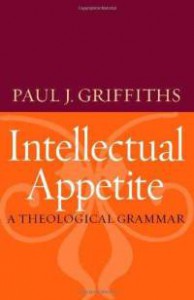 Paul J. Griffith’s 2009 book Intellectual Appetite: A Theological Grammar is a fascinating work. I’ve been reading it a little bit at a time over the past few months. When you’re reading a book that’s all about analyzing the desire to read and know things, you think twice about gobbling down chapter after chapter. So I’m taking it slowly.
Paul J. Griffith’s 2009 book Intellectual Appetite: A Theological Grammar is a fascinating work. I’ve been reading it a little bit at a time over the past few months. When you’re reading a book that’s all about analyzing the desire to read and know things, you think twice about gobbling down chapter after chapter. So I’m taking it slowly.
But I just read a very helpful review of the book in the journal Modern Theology. The reviewer (John Cavadini of Notre Dame) appreciated Intellectual Appetite, though he registered a few concerns about it (“I worry that, for an Augustinian book, this one has a decidedly un-Augustinian feel to it”). What stood out to me in the review, though, is how perfectly it summarized the key ideas of the book. “Intellectual appetite” is a phrase that names a particular human drive considered in the abstract. Concretely in any particular human or cultural life, it will take one of two forms: studiositas or curiositas. Here is Cavadini’s summary paraphrase of Griffiths’ argument:
The author presents his argument as an Augustinian account of intellectual appetite. Properly formed or “catechized,” it results in the virtue of studiositas; but deformed according to an alternative, worldly “catechesis,” it becomes the opposite vice of curiositas. Here is the basic “grammar” of intellectual appetite. Further, all desire for knowledge is a desire for the unique intimacy with something that comes about through knowing. In the “studious,” this desire is for communion with the known, and, through the known, communion with God. It involves the knowledge that any particular known is a gift from God. In the “curious,” however, the intimacy desired is not one of communion, but one of ownership. The curious want to “sequester” what is known as a kind of private property, such that what they are rejoicing in when they know is essentially not the known, but themselves as owners, apart from God’s economy of gift, and thus apart from God. Such is the “damage” that has accrued to human beings in the Fall that curiositas seems to present a viable and persuasive prospect for the intellectual life.
While the “studious” come to know the world ever more deeply as an economy of gift and therefore an economy of grateful wonder, the curious come to know the world as a place to be managed, classified and tabulated in encyclopedic taxonomies that claim to offer an exhaustive knowledge of the whole. The “studious” see the world as an “icon” of God’s generosity; the “curious” see it as a “spectacle,” an object whose main appeal is that it can be “reduced” to a catalogue, tamed and domesticated to those whose knowledge has achieved such mastery. The “studious” are not interested in novelty or originality per se, since all is known to God, and in fact the most important things are able to be known, in principle, to everyone. The curious, on the other hand, form an elite precisely in order to appreciate the novelty of their members’ achievements.
These are things worth thinking about as a new semester of study looms!